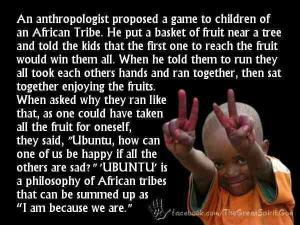In the Spirit of Ubuntu
umuntu ngumuntu ngabantu: a person is a person through other persons
I am . . . because we are
”What every single human being longs for, at the deepest level, is to be seen for who they are.” (Sarita Chawla)

“The Quaker teacher Douglas Steele was fond of saying that the ancient human question ‘Who am I?’ leads inevitably to the equally important question ‘Whose am I?’ – for there is no selfhood outside of relationship.” (Parker Palmer, Let Your Life Speak)
“Everybody is half-dead. Everybody avoids everybody, all over the place, in most situations, most all the time. I know; I’m one of those ‘everybodys.’ And, to me, it’s terrible. And so all I’m trying to do, all the time, is just open people up so they…let themselves be open to somebody else. That is all. That’s it.” -Nina Simone
“Neighbors, coworkers, and even family members can live side by side for years without learning much about each other’s lives. As a result, we lose something of great value, for the more we know about another’s story, the harder it is to hate or harm that person.” (Parker Palmer, A Hidden Wholeness, p. 123)
Sawubona is a greeting from the Zulu tribe in South Africa that follows the deeply honoring spirit of Ubuntu in its attitude toward people and its approach to life. Our lives can be instructed by such wisdom. I’ll spend a lifetime in pursuit of such a pure, simple, and deep honoring of the soul.
by Brian Watts
If a stranger came up to you and said “Sawubona”, would you know how to respond?
Yesterday, I heard a compelling leader originally from South Africa who among other things was talking about his efforts to build a vibrant community in a very impoverished urban setting. At the conclusion of his talk, he mentioned that the Zulu people of South Africa use the greeting “Sawubona” and their response “Ngikhona”. The literal meaning behind these words is beautiful and I’ll explain in a minute….
How many times in each and every day do we pass strangers on the sidewalk, interact with the store check-out person, or in countless other ways have an opportunity to greet someone we don’t know? How often to do choose to offer only an obligatory “hi”, “hey”, a disengaged smile, or worse yet, no acknowledgment at all? How many “friendly strangers” do we have in our life that we know nothing about – people who we have never spoken to and yet we see them as part of our routine every day? Are we really too busy to offer someone a genuine smile and greeting that is truly meaningful to them, even if we don’t know them?
What impact might we have on both them AND US if we consciously (and in time, unconsciously) choose to really connect with these people, even if only briefly?
Back to our Zulu words…what struck me about these words is the gift behind them: “Sawubona” literally means “I see you”. In the Zulu community, if you just walk past someone without greeting them properly, regardless of whether you know them or not, it is considered very offensive because what you are actually communicating to them is that they do not exist in your eyes, or that they don’t matter enough to bother greeting them. So in the Zulu community, you can count on always being greeted.
The response “Ngikhona” means “I am here” , “I am validated”, “I matter”.
It reminds me of a quote that I love by Philip Toshio Sudo, “Speak directly from your heart to the heart of your listener, as if passing the flame of a candle.”.
What a much more life-affirming approach compared to our all-too-habitual obligatory acknowledgement or disinterest in connecting with a stranger! Think back to a time when a stranger made an effort to “see you” – how differently we feel when leaving such an encounter! What a simple step we can take as leaders to build and connect our communities just a little bit more strongly.
So my challenge for all of us…begin again! The next time (which will likely be today!) that you pass or interact with a stranger, remember the meaning behind these Zulu greetings, remember to pass the flame from your heart to theirs, and make the effort to really see that other person for who they are.
Sawubona-a Zulu word that means -greetings, I see you. My name is Mbali, Zulu for the flower. I would like to begin by trying to explain the deep meaning of Ubuntu and what I hope this blog will offer. Ubuntu is a South African word that speaks to the very essence of being human. It is in its complexity quite simple and beautiful, here are some explanations from different sources I found interesting.
Wikepedia: Ubuntu, an ethic or humanist philosophy often summarised as humanity towards others.
Buntu Mfenyana, a Johannesburg sociolinguist, says that to understand the full meaning of the word ubuntu one must first separate the prefix ubu –from the root -ntu.
“Ntu is an an ancestor who got human society going. He gave us our way of life as human beings. It is a communal way of life which says that society must be run for the sake of all. This requires cooperation, sharing and charity. There should be no widows or orphans left alone-they all belong to someone. If a man does not have a cow, then give him a cow to milk. There should be no ohlelekileyo or deprived person.
Ubu refers to the abstract. So ubuntu is the quality of being human. It is the quality, or the behaviuor, of ntu society, that is, sharing, charitableness, cooperation. It is this quality which distinguishes a human creature from an animal or a spirit. When you do something that is not humane then you are being like an animal.
Taken from Sash Magazine February 1986 p.2
Rev. Desmond Tutu is fond of quoting the word, he says:
It is to say “my humanity is caught up, is inextricably bound up, in yours. A person is a person through other persons. I am human because I belong. I partipate, I share. I am available, open and affirming of others. A person with Ubuntu does not feel threatened that others are able, are good, they are self assured knowing that they belong in a greater whole”
It is to say “my humanity is caught up, is inextricably bound up, in yours. A person is a person through other persons. I am human because I belong. I partipate, I share. I am available, open and affirming of others. A person with Ubuntu does not feel threatened that others are able, are good, they are self assured knowing that they belong in a greater whole”
They suffer when others suffer and are humiliated when others are oppressed or treated unjustly.
When it was not popular or even encouraged among black South Africans Steve Biko took a stand for dignity, for humanity, for ubuntu . His struggle was for “humaness.”
Today in a meeting I witnessed a group of people who gather together because their common purpose is the wellbeing of homeless young adults -humanity towards others. Ubuntu
This blog is dedicated to all children, brothers, sisters and elders who continue to live in dire poverty in South Africa long after apartheid is over. Who have survived and continue to survive in honor of the strength -fire, they have inherited from the ancestors who came before them, without whom we would not be here.
Hamba Kahle! (Zulu for -Go well)
Martin luther King said it another way, ” In a sense all of life is inter-related. All men are caught in an inescapable network of mutuality, tied in a single garment of destiny. Whatever affects one directly, affects all indirectly. I can never be what I ought to be until you are what you ought to be”
Archbishop Desmond Tutu offered a definition in a 1999 book: “A person with Ubuntu is open and available to others, affirming of others, does not feel threatened that others are able and good, for he or she has a proper self-assurance that comes from knowing that he or she belongs in a greater whole and is diminished when others are humiliated or diminished, when others are tortured or oppressed.”
Archbishop Desmond Tutu further explained Ubuntu in 2008: “One of the sayings in our country is Ubuntu – the essence of being human. Ubuntu speaks particularly about the fact that you can’t exist as a human being in isolation. It speaks about our interconnectedness. You can’t be human all by yourself, and when you have this quality – Ubuntu – you are known for your generosity.
“We think of ourselves far too frequently as just individuals, separated from one another, whereas you are connected and what you do affects the whole world. When you do well, it spreads out; it is for the whole of humanity.”
Louw (1998) suggests that the concept of ubuntu defines the individual in their several relationships with others, and stresses the importance of ubuntu as a religious concept. He states that while the Zulumaxim umuntu ngumuntu ngabantu (“a person is a person through (other) persons”) may have no apparent religious connotations in the context of Western society, in an African context it suggests that the person one is to become by behaving with humanity is an ancestor worthy of respect or veneration. Those who uphold the principle of ubuntu throughout their lives will, in death, achieve a unity with those still living.
Nelson Mandela explained Ubuntu as follows: “A traveler through a country would stop at a village and he didn’t have to ask for food or for water. Once he stops, the people give him food, entertain him. That is one aspect of Ubuntu but it will have various aspects. Ubuntu does not mean that people should not enrich themselves. The question therefore is: Are you going to do so in order to enable the community around you to be able to improve?”
Maori greeting, Aotearoa (New Zealand) The Maori greeting and custom of touching foreheads and noses together allowing one to share the same breath is called the Hongi. It is a way of seeing each other on a soul level, seeing each other as equal…
The Maori greeting and custom of touching foreheads and noses together allowing one to share the same breath is called the Hongi. It is a way of seeing each other on a soul level, seeing each other as equal…
First published on December 7, 2008
https://ronirvine.wordpress.com/2008/12/07/honoring-the-soul/
 The Maori greeting and custom of touching foreheads and noses together allowing one to share the same breath is called the Hongi. It is a way of seeing each other on a soul level, seeing each other as equal…
The Maori greeting and custom of touching foreheads and noses together allowing one to share the same breath is called the Hongi. It is a way of seeing each other on a soul level, seeing each other as equal…First published on December 7, 2008
https://ronirvine.wordpress.com/2008/12/07/honoring-the-soul/


No comments:
Post a Comment